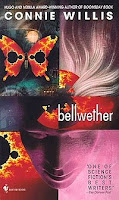Bellwether
by Connie Willis
Bantam Spectra, 1996
196 pages
Have you ever had that weird thing happen where something you've read or heard in one part of your life connects randomly and neatly with something in a completely different part of your life? For example, I finished reading Bellwether and then CBC's The Current had a major piece on the ethics of corporate policies preventing the hiring of smokers the very next morning. It was startling. It was also very, very cool to see how prescient Willis in fact is. And it gave me a whole different perspective on the real-life issue. And hearing people discuss the real-life issue gave me a bit of a different perspective on the book, too.
I adore To Say Nothing of the Dog. I was therefore very keen to get to this book at some point, and I was kind of feeling stuck with my reading. Darla had reviewed it not long ago, so it was on my radar. And my local library had this available as an eBook and it wasn't on hold, either. And like To Say Nothing of the Dog, this book is an ideal combination for me: amusing and not totally serious about itself, but with some serious intellectual meat and chock-full of literary references. Even better, this book is steeped in the poetry of Robert Browning and science lore.
Sandra Foster, our first-person narrator, is a sociologist and statistician working for a company named HiTek. She researches fads, and is currently trying to find the source of the women's hair-bobbing fad of the 1920s, a task she likens to the historical task of trying to find the source of the Nile -- but more difficult. In addition to her research project, she is coping with a hopelessly awful interdepartmental assistant, attempting to discover the secret of a chaos theorist coworker who seems to be totally immune to fads, and trying to rescue classic novels and poetry from being discarded from the local library due to lack of popularity.
There is not a lot at stake here, except for perhaps Sandra's funding and therefore job, and the extreme long-shot odds of winning a Neibnitz Grant, the most prestigious and lucrative scientific award around. Sandra is an engaging narrator, taking us on wonderful, erudite tangents that circle around to the relevant; sharp, funny, and sarcastic. So it becomes quite important to us that she get her funding, that she find the source of the fad, that she is happy. It is impossible not to root for her, even when she is a bit clueless (very rare) or a bit prickly (not quite so rare). It's also hard not to root for her because the things she's up against are often totally ludicrous.
If I had one complaint, and it's not even really a complaint so much as an observation, I don't think this book is quite as subtle as To Say Nothing of the Dog. (I know, I know, I keep comparing, and it's not entirely fair.) It's a short book, and the things Sandra is up against are so over-the-top it becomes almost impossible to believe that she wouldn't be able to overcome them. Management at HiTek is an amalgam of all of the worst possible things about management in a large corporation. Dr. Alicia Turnbull is terribly one-dimensional. Flip, the interdepartmental assistant from Hell, is ... well, the interdepartmental assistant from Hell. She's so awful it's almost impossible to comprehend how she could even make it through a day, doing things like feeding herself and walking up and down stairs. On the other hand, she is not one-dimensional. She's actually a pretty interesting character. Awfully horrifying, but interesting.
The thing is, it's fun. It's smart fun. It's satirical fun. So I can forgive the unsubtle, larger-than-life ridiculousness of what Sandra ends up observing and coping with herself. I can forgive the dig at libraries discarding unused materials, even the really good ones, to save shelf space (because it is uncomfortably true) and I can agree that there is a disturbing analogy to be made between human behaviour and the behaviour of a flock of sheep. It's funny, and it's not, because it's true.
Suffice to say, I think you should read this. It's not long and it's totally, wonderfully worth it. I have purchased Blackout sight unseen (while I was purchasing Bellwether at the same time) and I don't do that often. But Connie Willis is turning out to be an author I want to have on my shelves. She re-reads well, if both To Say Nothing of the Dog and Bellwether are any indication -- I finished Bellwether the first time, and am already halfway through it again. I've read To Say Nothing of the Dog three times now, with a fourth coming up when I inflict it upon my long-suffering genre book club. With both there are new things to be discovered, and wonderful writing to be savoured. And you will come out the other end feeling just a little bit smarter, and maybe even a little bit wiser.

No comments:
Post a Comment